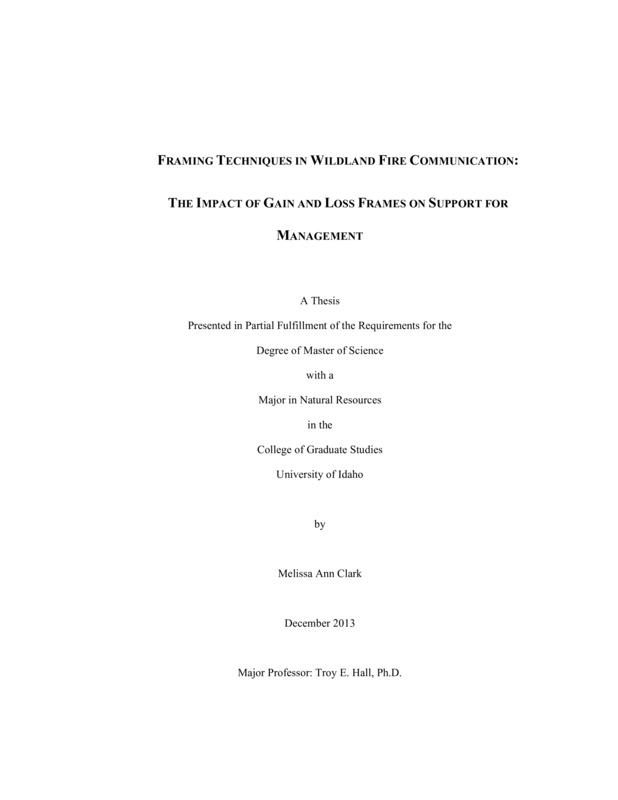Framing techniques in wildland fire communication: The impact of gain and loss frames on support for management
Clark, Melissa A.. (2013). Framing techniques in wildland fire communication: The impact of gain and loss frames on support for management. Theses and Dissertations Collection, University of Idaho Library Digital Collections. https://www.lib.uidaho.edu/digital/etd/items/clark_idaho_0089m_10064.html
- Title:
- Framing techniques in wildland fire communication: The impact of gain and loss frames on support for management
- Author:
- Clark, Melissa A.
- Date:
- 2013
- Program:
- Natural Resources
- Subject Category:
- Communication; Environmental management; Environmental studies
- Abstract:
-
The goal of this study was to add to our scientific knowledge about best practices for environmental risk communication, while producing applied materials for managers and stakeholders. I used a quasi-experimental pre-/post-test design to examine how two differently framed messages about wildfire projections for the northern Rocky Mountains influence attitudes about management actions. Participants were randomly assigned to a treatment group and asked to review a flyer presenting information about increasing wildland fire risk in the northern Rocky Mountains and risk reduction actions. One treatment flyer presented positive outcomes of taking action (gain frame), while the other presented negative outcomes of not taking action (loss frame). Current research has identified gain and loss frames as a needed area of study in climate change communication, as both frames have led to increases in perception of environmental problem severity, but it remains unclear how frames will influence attitudes, intentions and behavior (Spence & Pidgeon, 2010). I hypothesized that loss framed messages would lead to deeper cognitive processing and therefore more positive attitudes.
This study contributes to our theoretical understanding of framing effects on attitudes by showing a significant effect of frame type on cognitive processing. Participants in this study engaged in deeper cognitive processing after reading the loss framed treatment flyer. However, my results did not indicate that either frame was effective at influencing attitudes about wildland fire management. Despite the impact of the loss frame on cognitive processing, other studies indicate that the using the gain frame is more likely to influence attitudes. My results call into question whether the effects of framing are likely to be substantial in the context of wildland fire. Nevertheless, this study can contribute to our understanding of existing attitudes by providing data on current levels of support for a variety of management actions, which range from fuel reduction to community policies.
The summary report of this study (Appendix F) provides a description of participants' attitudes about management, a short description of the communication techniques used in the flyer, and recommendations gathered from the literature advocating the use of gain framed information. This summary and the gain flyer will be made available to managers and stakeholders.
- Description:
- masters, M.S., Natural Resources -- University of Idaho - College of Graduate Studies, 2013
- Major Professor:
- Hall, Troy E
- Committee:
- Krumpe, Ed; Teston, Christa
- Defense Date:
- 2013
- Identifier:
- Clark_idaho_0089M_10064
- Type:
- Text
- Format Original:
- Format:
- application/pdf
- Rights:
- In Copyright - Educational Use Permitted. For more information, please contact University of Idaho Library Special Collections and Archives Department at libspec@uidaho.edu.
- Standardized Rights:
- http://rightsstatements.org/vocab/InC-EDU/1.0/

